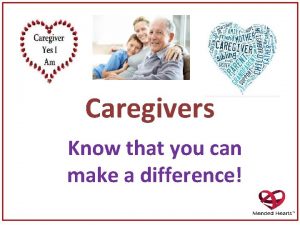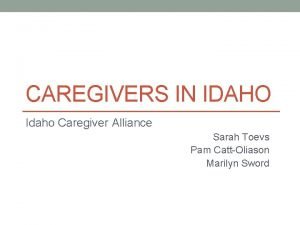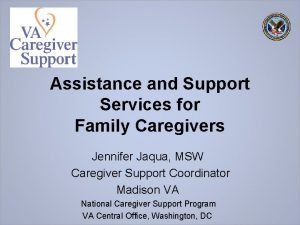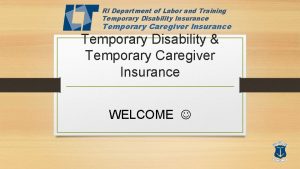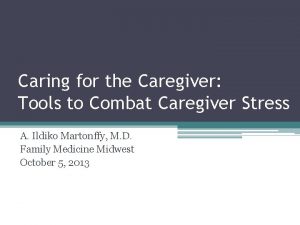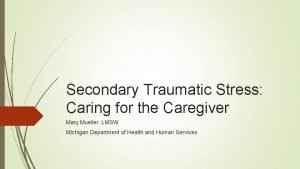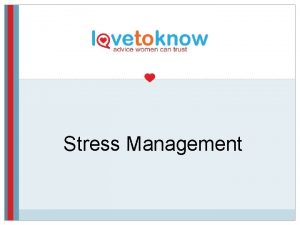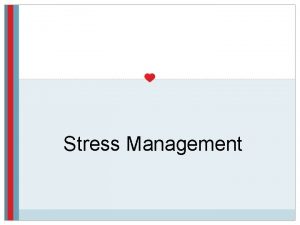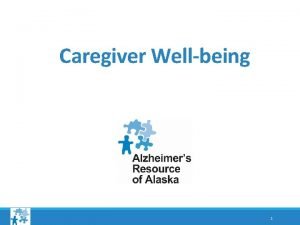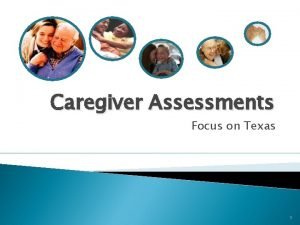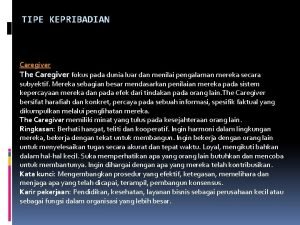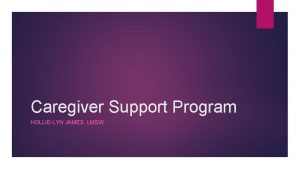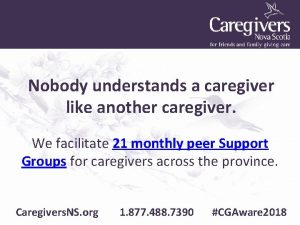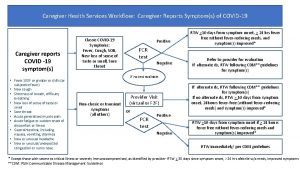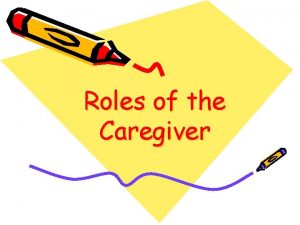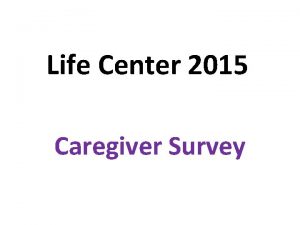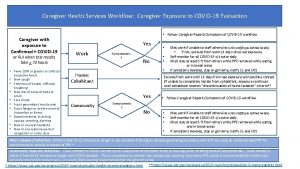Caring for the Caregiver Caregiver Stress Management Tips

































- Slides: 33

Caring for the Caregiver: Caregiver Stress Management Tips and Tools 1

Learning Objectives Participants will be able to: • Understand the impact of the caregiver role on physical and psychological health • Identify techniques for caregiver stress management We value your opinion. Please ask your instructor for an evaluation form at the close of this session. 2

Serenity Grant me the Serenity to accept the things I cannot change; the Courage to change things I can; and The Wisdom to know the difference. How does this well known quote fit with caregiver stress management? 3

Survey Highlights of People Who ‘Self-Identify’ as Family Caregivers, National Family Caregivers Association, 2000 • 91% believe “preserving your health” is a message that should be told to all family caregivers • 30% exercise regularly since becoming caregivers, compared with 61% who exercised before becoming caregivers • 47% seek prompt medical attention for themselves compared to 70% who did so before becoming caregivers 4

Wellness is the Goal at All Ages A Healthy Balance for You and Your Family Member Spiritual Emotional Faith Physical Meaning in life Friendship Nutrition Connected to others Exercise Sense of well being Part of a family and community Financial Security Independence Flexibility Developed by Zanda Hilger Mental Activities and hobbies Problem-solving Continuing education 5

Healthy Nutrition, 1 • Evaluate healthy nutrition habits and make changes • Discuss nutrition needs related to health, medications, activity level and other factors • Discuss vitamins and other supplements with the physician • Consult with a dietician, if possible • Use nutritious meals that can be frozen or quickly heated • In addition, for older adults – Learn about nutrition - People over 70 may require smaller portions of all groups except more of the milk, yogurt and cheese group – Arrange for Meals on Wheels or other community assistance for older adults, if possible 6

Healthy Nutrition, 2 • Drink lots of water • Eat fresh fruits and vegetables • Consume plenty of fiber • Consider vitamins and other supplements 7

FDA Food Plate Go to http: //www. choosemyplate. gov practical tips about • healthy eating on a budget • your own food tracking system • nutrition education • sample menus and recipes • daily food plans 8

Activity and Exercise • Stay active! • Become an active partner with the physician and other health care providers • Walk whenever you can • Respect your body and listen to it • Exercise/sports - find a system or plan that works for you, commit to it and practice on a consistent basis – Choose one that works for you: walking, exercise bicycle, weight training, dancing, group exercise, yoga, Tai Chi • Make exercise a priority (schedule it, if necessary): • For older adults, stretching and light exercise benefits mind and body, if approved by physician and the person is able to participate • Practice deep breathing to release stress 9

Your Time • Calendar: use one that suits your personality and responsibilities • Ask yourself the question: “What is the best use of my time right now? ” • Break overwhelming tasks into a series of small steps • Schedule all activities to ensure they are done - unless they just are not important • Are you over committing your time? • Look ahead/plan ahead • Document completions/note successes Time Stress -Loss of control over activities -Constant deadlines -Conflicting priorities and demands for time -Effects of time schedules 10

All That Stuff- Chunk The Junk • Evaluate it • Give it away • Pass it on • Plan/organize it • Consolidate • Handle it as little as possible • Eliminate all that extra paper 11

Record Keeping • Make lists and use the A-B-C system • Remember the Pareto’s 80/20 rule* • Handle paper and information once –Delete it –File it –Delegate/forward –Do something and complete –Make lists - one book method *“Eighty percent of your troubles will come from 20 per cent of your problems" 12

Files File folders: Labeling: – Days of the month/months of the year – Dates – Pending – Contact numbers – Project – Customized – People Like things grouped together – Consider color coding, according to categories 13

Are You Using Your Computer Wisely? • How often do you really need to check e-mail? How often depends on priority at work at and home • Use bookmarks • Learn as much as you can about newest technology only if it really helps you manage your time and life • Are you backing up information? • When do you need a hard copy? Manage the paper and machines in your life Are you being managed by them? 14

The Telephone • Set aside uninterrupted time during which you do not answer the telephone • Suggest specific times for people to call you • Use voice mail, answering machines, email, Call Notes© • Be specific in leaving messages about the best time to return your calls 15

Emotional Life • Communicate • “What are my priorities? ” • “What did I do today to show my (family)(co-workers) that I value them? ” • “Did I keep all my commitments? 16

Mental and Spiritual Life • Keep your mind active: – Read • Set aside quiet time or “down time” every day – Attend adult education classes • Enjoy nature; take a walk – Participate in community activities • Find or re-discover a spiritual path: – Prayer – Meditation – Organized worship 17

Chinese symbol Practical Stress for Crisis: “opportunity riding Management Tips a dangerous wind” • Manage stress before the situation becomes a crisis • Reframe your perception of situations • Ask for help Set up a Job Jar of things that you need help with and when someone asks what they can do let them choose a task to do • Recognize your history and what triggers your stress response “If you always do what you have always done you will always get what you always got” • What do you have control over? What can you influence? • Take care of your physical and mental health • Have some fun Avoid Burnout! • Respond - don't react 18

Practical Stress Management Tips • Breathe! • Practice letting go • Be willing to accept that sometimes enough is okay • Take one day at a time and value it as if it were your last • Prioritize activities according to importance and available time Activity does not necessarily mean • Join a support group productivity • Decide and “Just do it” • Recognize the harmful effects of perfectionism and take steps to be more flexible • Remind yourself of the high cost of worry and the low return 19

Reasons Someone Joins a Support Group 1. It was the only place where I could say how I felt and people would understand 2. I learned where to go for help in caring for my loved one 3. 4. 5. 6. I could be angry about how I was dealt a low by "Fate" and others would say it's ok to feel that way 7. I could find help on how to handle difficult behavior problems I realized it was possible to laugh at some of the impossible, crazy things that happened during the 8. day I discovered that it was important to have some time for myself to 9. do the things I want to do, and NOT feel guilty I learned to stop trying to teach and correct or reason with my loved one Instead, I learned to accept that the way he saw things was very real to him I learned that I should not be the only one responsible for caring for my loved one I found I could cope because of the support, caring and understanding of others in my support group 10. I made new friends during a time that I seemed to be losing old ones 20

Establish and Maintain Winning Relationships • Communicate; take the initiative • Surround yourself with winners • Avoid negative and critical people • Be real and true to yourself • Believe that “what goes around comes around” www. redhatsociety. org • Listen 21

Keep Your Sense of Humor 22

Re-Evaluate and Re-Balance Your Priorities • “Am I sure about what matters most? ” • “What am I learning? ” • “What am I doing to take care of myself? ” • “What can I delegate or ask help with? ” • “What can I say no to? ” 23

Top 10 Ways to Manage Your Time and Your Stress (Apologies to David Letterman) 10. Get rid of unnecessary stuff ‘chunk the junk’ 9. Be realistic 8. Prioritize 7. Decide 6. Rid yourself of as many interruptions as possible 5. Ask for help 4. Make lists and do what is written on them 3. Plan “if you don’t know where you are going you will end up somewhere else” 2. KISS-keep it simple and sane 1. Take one day at a time and value it as if it were your last 24

Resources For Caregivers Call • 2 -1 -1 throughout Texas. Provides information and access to health and human service information for all ages • 1 -800 -252 -9240 to find local Texas Area Agency on Aging • 1 -800 -677 -1116 - Elder Care Locator to find help throughout the United States Online • Family Caregivers Online www. familycaregiversonline. net • Online education, resources, links, frequently asked questions • Benefits Check-up www. benefitscheckup. org for an online way to determine benefits for which someone qualifies. To schedule a caregiver presentation for your church, business, library, civic group, or other location, call your local area agency on aging or send an email from www. familycaregiversonline. net 25

What Assistance May be Available Through the Area Agency on Aging (AAA)? Services differ by county Caregiver Services • Information and referral • Caregiver education and training • Caregiver respite • Caregiver support coordination • Transportation assistance Services for persons age 60 and older • Benefits counseling • Ombudsman - advocacy for those who live in nursing homes and assisted living facilities • Home delivered meals • Congregate meals • Light housekeeping 26

We chose the aspen tree to represent family caregivers and their loved one © • Aspen trees appear to be individuals. In reality, they are one organism sharing the same farreaching root system. These interconnected roots give the aspen resilience, strength and beauty, often in the harsh conditions of winter at high elevations. Like aspen trees, family caregivers, their aging family members, health and human service providers, and the community are all connected Just because you care doesn’t mean you have to do it alone! 27

Taking Care of Yourself! • What would you tell someone else in your shoes? • Make a commitment to yourself to take your own advice and take care of you! • If you do, you will take better care of your loved one 28

What Are You Willing to Do Differently? It is up to you and you are worth it “If it is to be it is up to me” * *Hattie Hill 29

What one resource or idea was the most valuable for you? Take care of yourself in your role as a family caregiver! 30

Optional Individual Activity: Follow-up Reminder To Walk the Talk • Write yourself a letter, dated today, reminding yourself about what you decided to do today about managing your stress and time • Address an envelope to yourself • Seal the letter in the envelope • In 30 days mail it to yourself • When you receive it open it, read it and walk the talk! 31

Optional Group Activity: • Brainstorm in your group recommendations to give family caregivers in taking care of themselves • Illustrate your suggestions on a flip chart • Appoint a spokesperson to report your suggestions 32

§ § Written by: Zanda Hilger, M. Ed. , LPC, Family Caregiver Education, Area Agency on Aging. Revised 2013 by Zanda Hilger; 2009 by Zanda Hilger and Betty Purkey. Permission is granted to duplicate any and all parts of this program to use in education programs supporting family members caring for elders. Go to www. familycaregiversonline. net for more information about this and other training programs, internet links, legal forms, fact sheets and more. Funded in part by area agencies on aging with federal funds through the Texas Department on Aging and Disability Services 33
 Dr jean watson
Dr jean watson Chapter 10 stress responses and stress management
Chapter 10 stress responses and stress management True strain formula
True strain formula Definition of normal stress
Definition of normal stress Caregiver sos wellmed
Caregiver sos wellmed Caregiver anxiety
Caregiver anxiety Protective capacity assessment
Protective capacity assessment Caregiver prayer
Caregiver prayer Caregivers alliance
Caregivers alliance Az caregiver coalition
Az caregiver coalition Va caregiver support
Va caregiver support Ri temporary caregiver insurance
Ri temporary caregiver insurance Oklahoma uniform symbol omma
Oklahoma uniform symbol omma Caregiver formale
Caregiver formale Staff management tips
Staff management tips Sql server management studio tips and tricks
Sql server management studio tips and tricks Time management tips for high school students
Time management tips for high school students Global management challenge manual
Global management challenge manual Iso 22301 utbildning
Iso 22301 utbildning Novell typiska drag
Novell typiska drag Tack för att ni lyssnade bild
Tack för att ni lyssnade bild Ekologiskt fotavtryck
Ekologiskt fotavtryck Varför kallas perioden 1918-1939 för mellankrigstiden?
Varför kallas perioden 1918-1939 för mellankrigstiden? En lathund för arbete med kontinuitetshantering
En lathund för arbete med kontinuitetshantering Adressändring ideell förening
Adressändring ideell förening Tidböcker
Tidböcker Sura för anatom
Sura för anatom Vad är densitet
Vad är densitet Datorkunskap för nybörjare
Datorkunskap för nybörjare Boverket ka
Boverket ka Debattartikel mall
Debattartikel mall Delegerande ledarskap
Delegerande ledarskap Nyckelkompetenser för livslångt lärande
Nyckelkompetenser för livslångt lärande Påbyggnader för flakfordon
Påbyggnader för flakfordon





